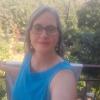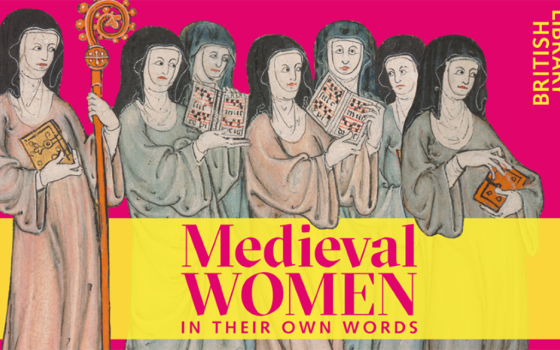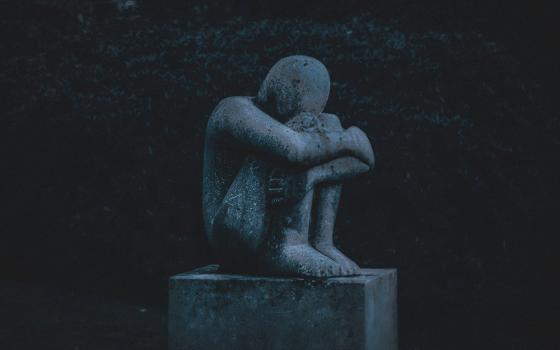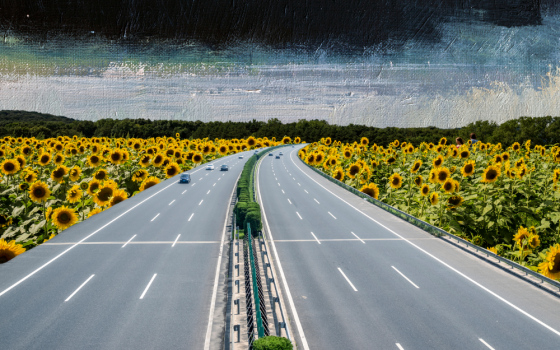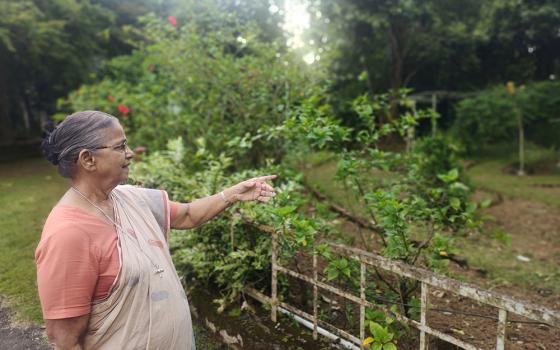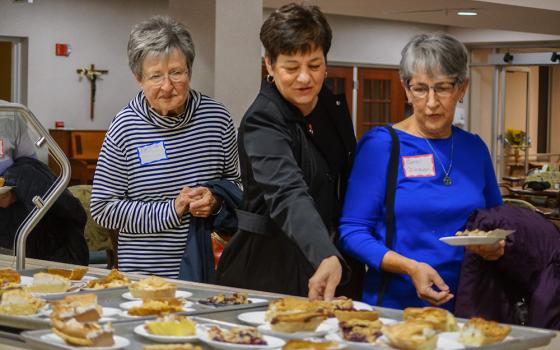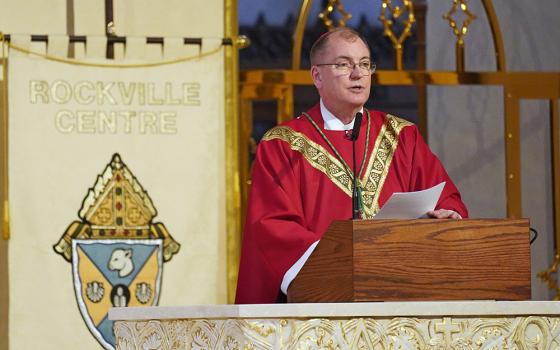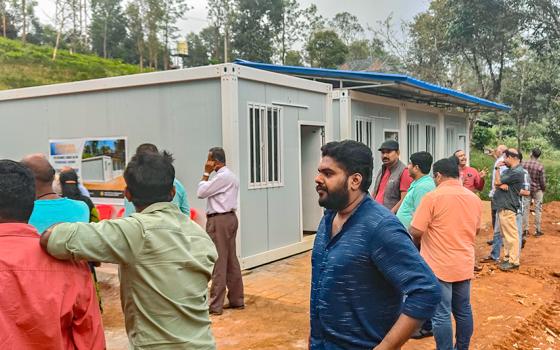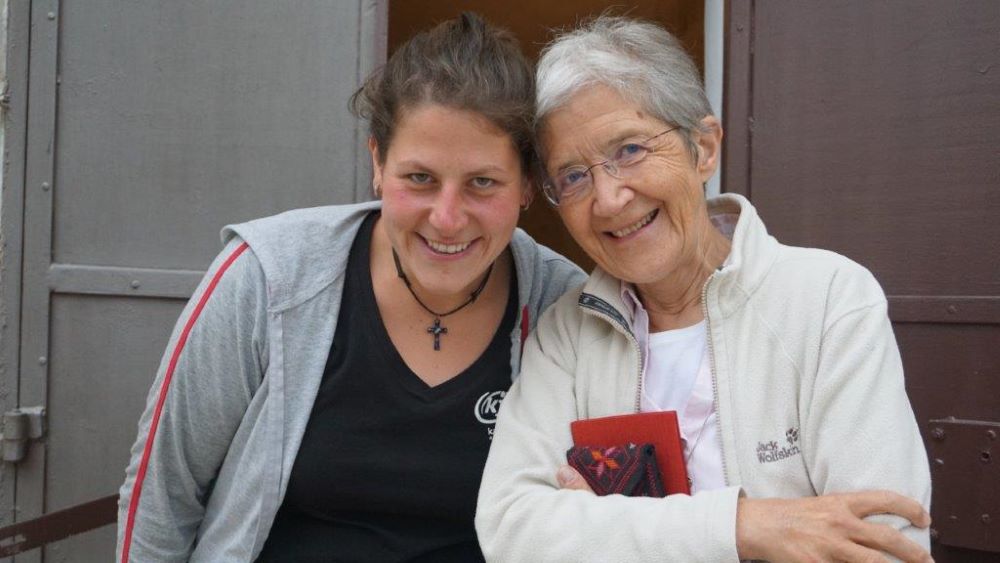
Sr. Hildegard Enzenhofer (right) poses with a volunteer at Beit Emmaus Home for the elderly and disabled in the Palestinian village of Qubeibeh. Enzenhofer is leaving the Holy Land after serving as the home's administrator since 2001. (Courtesy of Hildegard Enzenhofer)
After serving as a hospital administrator for her community in Austria, Salvatorian Sr. Hildegard Enzenhofer was called to the Holy Land in 2001 to step in as administrator of the congregation's nursing home after the previous Salvatorian sister administrator suffered a heart attack.
Beit Emmaus Home for the elderly and disabled in the Palestinian village of Qubeibeh. is nestled between Jerusalem and Ramallah in the West Bank, one of a handful of sites in the Holy Land associated with the Biblical village of Emmaus. The nursing home, which the Salvatorian sisters manage and is funded by the Holy Land Society in Germany, takes in poor, elderly and disabled women and provides 24/7 loving care.
The home is strongly dependent on international volunteers, But the COVID-19 pandemic and now the continuing Israel-Hamas war in Gaza following the Oct. 7 Hamas attack on southern Israel has prevented volunteers from coming to the nursing home. Local Palestinian employees have stepped in, as have volunteer nursing students from a Bethlehem University Faculty of Nursing satellite campus program the sisters manage on the convent grounds.
As Enzenhofer prepares to return to the provincial house this summer in Vienna, Austria, Global Sisters Report asked her to reflect on her service in the Holy Land and the path that led her there. Although she is leaving, she will continue working in various capacities for her congregation in the Holy Land, including fundraising for their Nazareth community and school, so she plans to return often to the Holy Land.
GSR: How did your religious life begin, and how did your parents react to your decision?
Enzenhofer: According to the local custom in Austria, where I was born, as the eldest living daughter of traditional farmers on a large, 1,500-year-old family farm in Upper Austria, I would inherit the entire farm. But my family was very religious, and by my first Communion, I already knew I would give my life to God. At 15, I told my parents I had found my vocation. Though my parents were surprised at first by my decision at such a young age, they were nevertheless supportive.
I found my vocation with the Salvatorian sisters when a neighbor who was a member of the community reached out to me. God provided me [with] everything. For me, my main vocation was to give my life to Jesus, whatever he showed me. But along the road, I learned the openness and the wideness of our congregation involving many people, working with people and being open to each culture and religion. So, slowly, this charism opened for me.
When I was 23, I took my vows and began working in hospital administration in nursing homes for the elderly.
Why did you choose to go into administration?
I strongly believe in the role of institutions. You are visible, [and] you can change something. You have influence.
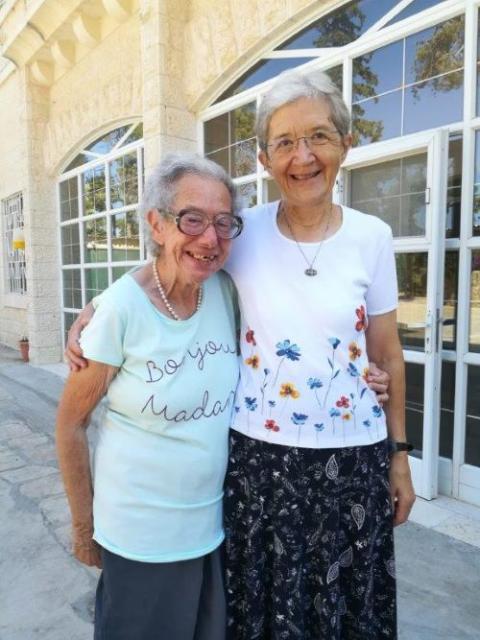
Sr. Hildegard Enzenhofer poses with Noel Mansour, a beloved former resident of Beit Emmaus Home in the Palestinian village of Qubeibeh. Mansour died at age 87 after having lived at the home since she was 50. (Courtesy of Hildegard Enzenhofer)
How did you decide to come to the Holy Land?
I had never thought about this. No, no, no, was my reaction. One day, I was thinking maybe I should go, and then the next day, I said no, I will not go. So that was it, back and forth until I told myself I needed to decide. So, I went to Switzerland for a one-month retreat with the Jesuits.
One day, I was standing on the mountain, not thinking about anything, just looking at the beautiful snow, and a sense of security overcame me. I said out loud: "Yes, Jesus, I will go to the Holy Land." So, from that moment, I was sure I would go.
You arrived in the Holy Land in 2002 during the second intifada. What was that like for you?
I saw all these pictures of the [uprising], and I thought: "Shall I really go?" But anyway, in the end, I went to the airport in Austria. But we didn't land [at the Israel airport] because the crew refused, so we had to change crew.
And here I saw checkpoints, all these soldiers. I had never seen a soldier with a gun, only in pictures. That was the time when there were always these suicide bombers. Once, just in front of me, a bus exploded.
I went home and wrote a letter to my spiritual director from the [Jesuit] retreat and told him I thought I had made a wrong decision. I thought, there is an airport, I can go home. He wrote me back one sentence — there was no email, no internet then — and he said: You made your decision, now it's time to live your decision.
That healed me in one way. But I had so much fear; these airplanes flying over the house and bombing in Ramallah, my goodness. When I went to Jerusalem, I didn't know if I would make it back home.
What do you like about working with the elderly?
I like older people. The encounter with these dying people is a big experience for me. When I was with my family at home … my grandparents died at home. Everybody was in the home two or three days before we buried them. Being with people you have known when they are healthy and then when they are dying was very important for my life. You ask yourself what is important in life.
I was sitting for hours and hours with dying people. [Later], it was a joy for me in our nursing home to see this, and also with our older sisters, who we began to take in. I knew them before, and it was very enriching. They were sharing their life with me. I like people and the relationships with people.
Can you tell us a bit about the nursing home in Qubeibeh and how you adjusted to working with the elderly in a different culture from your own?
We have 40 people living with us now, all Muslims, [and] mostly from the Ramallah area. I learned the spoken Palestinian Arabic. We had ten sisters when I came, and we have eight now, mostly from Germany and Austria. But it is changing, and there are also sisters from India and Poland. Maybe the language is different here, and we don't understand so well the culture that may be different. [But] each person, young or old, needs love, [and] to be shown love. This is most important.
This language exists all over the world: closeness and love. We learned, and we are learning. We have a different style of accompanying dying people in Austria or Europe. In Austria, when people say, "I don't want to eat anymore, I don't want to drink anymore," we accept this. This doesn't work here. Also, when they die, it is different. Muslims have their rituals. Christians have their rituals. But you learn this. For me, this was not difficult. It was, for me, a richness to see how different cultures and religions are working.
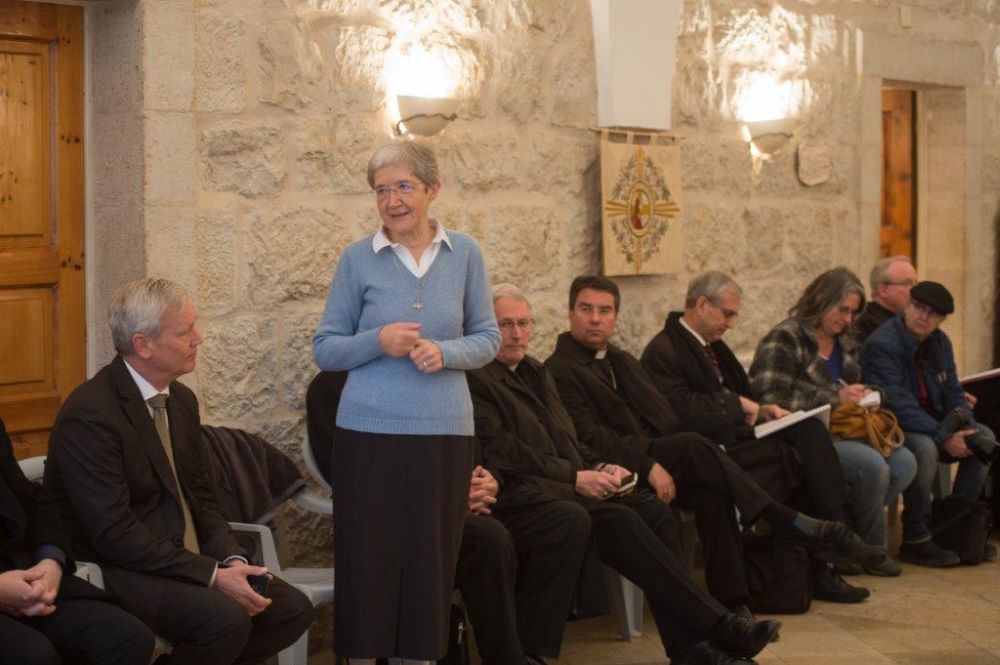
Sr. Hildegard Enzenhofer speaks with a group of visiting bishops at the Holy Land Coordination in Jordan in 2023. Enzenhofershe is returning to her congregation's provincial house in Vienna, Austria, after serving as administrator of Beit Emmaus Home since 2001. (Courtesy of Hildegard Enzenhofer)
How has life been for you since October 7?
I was cleaning my room on that Saturday, and I started to hear this boom, boom, boom. We were on a little mountain, and we heard the missiles coming from Gaza. I didn't know what was happening and went into the kitchen, and our workers said that [on the radio] they were being called to go to Jerusalem with knives and tools and tractors, whatever they had to go to Al-Aqsa and do something against the Israelis. Then I started listening, and only a few days later, we realized what [had] happened. That there was something we didn't know [because] you didn't hear it in the [Palestinian] news.
For us, all the checkpoints were closed, and the workers couldn't come to Qubeibeh, and workers couldn't go out to work. These days were terrible in our area. People were emptying all the shops, so in the house, we couldn't get, for instance, meat. We were struggling with food in the beginning, but we had very good workers and cooks. And they said, we know a friend, and this friend knows somebody else, and in the night they went for food. How they cared for us was a nice experience.
Now, there is enough food, but the checkpoint situation is difficult. Nobody can go over the border to work. We are living with this very abnormal situation as [if it were] normal. You have to adjust.
Was there someone in the nursing home who touched you in a special way?
That would be Noel Mansour. She died at the age of 87. She came to us young when she was 50. Her father was the first surgeon in Palestine. Noel was very intelligent. She spoke many languages. At one point, things switched, and she became schizophrenic, and her family asked if she could come to us.
I could go with Noel everywhere. I took her to Jerusalem and said: "Noel, go to the post office, do this, do that," and she did it. Two or three times a year, I went with her over the checkpoint to the American Colony Hotel in Jerusalem. That was a highlight for her.
She had a cuckoo clock and would come into my office with her clock. She went in and out. When I went out, sometimes she wrote on my official papers. And I said to her, "No way," and then she hugged me and said: "Now let's be good again."
Then she got COVID. At this time, you were not allowed to go with them to the hospital, [and] they could go only by ambulance. Patients waited outside in line until somebody died. So, the next day, I sent somebody to the hospital to check on her, and Noel was still sitting there in her little nightie, and her shoes were stolen. I said no way, and I called an ambulance to bring her back. Noel was so happy.
After [she showered and drank some milk], she wanted me to read her a letter her nephew had written her, but I said she was tired and [that] I would read it to her tomorrow. Then she looked at me and said, "You know, Sister Hildegard, you don't know how much I love you." And she turned her head to one side and died.
She was always next to me, and sometimes I couldn't stand it anymore. But she taught me something important in my life. She taught me to be patient and to be kind. Despite everything, I had beautiful talks with her. Her deep question was if God loved her. She had a deep longing to be with Jesus — who she believed very strongly loved her — when she died.
Advertisement
What perception of the Holy Land are you now leaving with?
[My perception] has changed a lot because when I came it was [more about]the churches. I was overwhelmed to be in all these churches, not just in Bethlehem but everywhere. But you know what I discovered in these years in my prayer time and everything? That the Holy Land is not a building. It is my place. It is the people. Jesus was born in this place, and he was suffering in this place.
My spirituality grew in this direction, that it is my place, my people, this is my Holy Land. So I don't need to go to a church in Jerusalem. It's nice to go, but this is not my [Holy Land]. And in this spirit, I can also leave the Holy Land. I don't leave people. I don't leave buildings. I will find these people all over.
You came at a time of violence, and you are leaving in a time of violence. How can this place be called the Holy Land when there's always so much violence here?
This violence is part of the history here. I am not stressing about that or researching this because I am living the now, and my mission is to make a better life for people through education [and] through work. This is also our spirituality. It starts with very, very small things.
If Noel was happy to have the cuckoo clock in my office and called me [sometimes inconveniently from meetings] on the full hour because she needed to hear this, [then] it was important for her. So I would go to open the office door if it made her happy.
What is the one thing you will miss the most when you leave?
I will miss the culture and the people here. And I will miss the food. The culture is beautiful. Very attentive. I learned from them that family and relationships are more important than work. If someone needs your help here, you leave everything and help them.
